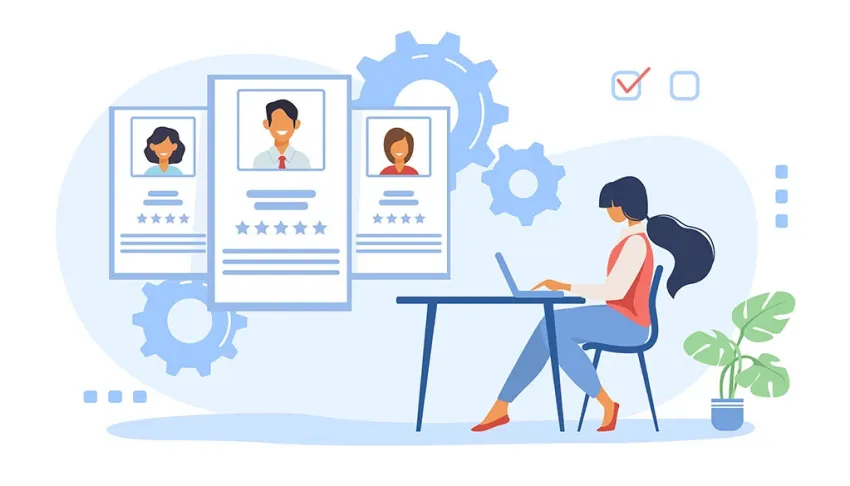
Menu

Menu

So, you came up with a great business idea, and you successfully set up your company. As it has grown steadily over the years, you’ve recruited more staff to meet the increasing demands of your expanding business. However, you now find yourself running a small to medium-sized organization, which, while exciting, also comes with its own set of challenges. Suddenly, all those paper files and Excel spreadsheets that once seemed manageable are now getting out of hand. As a result, you find yourself spending more time chasing after paperwork than you do managing your business effectively or engaging face-to-face with your team.
Consequently, this inefficiency not only hinders productivity but also limits your ability to foster a positive workplace culture. Moreover, the time lost to administrative tasks could be better spent on strategic initiatives that drive your business forward. With your focus diverted, you may struggle to keep up with the fast-paced changes in your industry, potentially missing out on valuable opportunities for growth and innovation. Therefore, it becomes increasingly clear that to navigate these challenges successfully, you need a streamlined approach to manage your workforce effectively.
Ultimately, embracing modern solutions is crucial for maintaining your competitive edge. By transitioning from outdated methods to more efficient systems, you can reclaim your valuable time, enhance collaboration, and improve overall organizational efficiency. This is where the benefits of automation in human resource management become apparent.

Maybe it’s time to look at how you can benefit from automating your HR activities!
In simple terms, human resource management software (HRMS) is a comprehensive solution that automates all the activities required to effectively and efficiently manage your workforce throughout the employee lifecycle—from hire to retire. Additionally, it improves productivity, accuracy, and effectiveness within the HR team while also enhancing the overall employee experience. Moreover, HRMS provides powerful analytics and reporting functions that aid management decision-making.
At its core, HR is fundamentally about people. Consequently, with an HRMS in place, your HR team can focus on supporting business goals by developing meaningful relationships with employees and management. In contrast, they are no longer stifled by mounting administrative tasks, which allows them to dedicate more time to strategic initiatives that drive organizational success.
However, for many SMEs, the idea of introducing an HRMS is often daunting. In fact, common misconceptions are that it requires a lot of technical knowledge, is expensive to implement, and is something that only larger organizations can benefit from. Nevertheless, this couldn’t be further from reality, especially with the latest HRMS solutions available today.
Additionally, many modern HRMS platforms are designed with user-friendly interfaces, making them accessible even to those with limited technical expertise. Furthermore, the cost of implementing an HRMS has decreased significantly over time, making it a feasible option for businesses of all sizes. Ultimately, embracing an HRMS can empower SMEs to streamline their processes and enhance efficiency, demonstrating that these solutions are not just for larger organizations.
Here are just some of the benefits you will gain from introducing a HRMS:
♦ Time-consuming tasks such as recruiting, onboarding, timekeeping, payroll, compensation and benefits and performance management can be automated.
♦ Self-service can empower managers and employees and take pressure off HR teams. With system portals, employees can update information, submit requests, and track processing, and HR teams can respond more effectively.
♦ Documents can be stored in the cloud and made available across a range of mobile devices, improving accessibility, and making it easier to maintain accuracy.
♦ Reports can be automatically generated to facilitate decision-making.
♦ Reducing human error through automation will improve employee experience, save cost, and save time in unnecessary re-work.
♦ Having all employee data, including leave and compensation, online means you can save storage space, quickly locate information, and ensure data security.
In the latest, innovative HRMS, strategic partnerships with service providers are seamlessly integrated. Consequently, this integration means that traditionally complex processes, such as visa applications and payroll management, can now be serviced externally. Specifically, the assigned service provider handles the request efficiently, prepares a quote, and invoices as appropriate. Additionally, they are responsible for collecting and delivering any original documents while communicating with HR Admin as needed throughout the process. Ultimately, this collaboration allows for the completion of the task with greater efficiency and effectiveness.

Manual workflows are rarely consistent; therefore, many businesses do not have established and defined standard HR processes. This inconsistency is particularly true of essential functions such as recruiting and onboarding, performance reviews and goal setting, as well as training and development. However, with HR automation, tasks are carried out in a consistent and uniform manner, which can be effectively audited. As a result, this automation not only enhances reliability but also ensures compliance with established standards.
The system keeps electronic records of items such as employee discipline notices, safety training, accident logs, compensation claims, and more. By doing so, it ensures that your business can easily meet the requirements for legal and health and safety regulations. Moreover, maintaining these electronic records simplifies compliance audits and enhances transparency within the organization.
In addition, having a centralized system for record-keeping reduces the likelihood of errors and misplaced documents, which can lead to costly fines or penalties. Furthermore, this digital approach allows HR teams to access critical information quickly, facilitating timely decision-making and effective responses to any issues that may arise. Ultimately, by utilizing such a system, businesses can not only safeguard their compliance but also promote a culture of accountability and safety in the workplace.
In today’s fast-paced business environment, managing HR processes manually is no longer practical. Therefore, businesses that continue relying on outdated methods like paper files and spreadsheets face challenges in staying competitive. By contrast, an HRMS helps eliminate inefficiencies by automating tedious, time-consuming tasks such as payroll, time tracking, and benefits administration. As a result, by streamlining these processes, HRMS not only saves time but also reduces the risk of human error, ensuring accuracy and compliance across the board.
Beyond administrative tasks, a well-implemented HRMS significantly enhances the employee experience. In fact, by allowing employees to access self-service portals, they can easily update their personal information, request time off, and view their benefits and payroll details in real-time. Consequently, this empowerment leads to greater job satisfaction, as employees feel more in control of their work-life balance. Furthermore, an HRMS provides managers with real-time data on employee performance and attendance, enabling them to make informed decisions that improve team productivity and morale.
A key advantage of modern HRMS platforms is their robust analytics and reporting features. Thus, these tools allow HR teams to gain valuable insights into workforce trends, employee performance, and operational efficiency. As a result, by analyzing this data, management can make strategic decisions that drive growth, improve retention rates, and optimize resource allocation. For instance, real-time reports on absenteeism, employee turnover, and recruitment success rates help identify areas for improvement, ultimately enhancing overall business performance.
Compliance with labor laws, safety regulations, and company policies is critical for every business. Therefore, an HRMS helps organizations stay compliant by automatically updating legal requirements and maintaining accurate records. Additionally, with features like electronic document storage and automated alerts for upcoming certifications or deadlines, businesses can mitigate risks and avoid penalties. Moreover, having centralized, easily accessible records ensures that HR departments can quickly respond to audits or legal inquiries, further safeguarding the company.
As your business grows, so do your HR needs. Fortunately, the scalability of HRMS solutions allows companies of all sizes to customize their systems according to their unique requirements. Whether you’re managing a small team or a large workforce, HRMS can easily scale to accommodate your growing needs. In this way, this flexibility ensures that as your company expands, your HR processes remain efficient and effective, without requiring significant additional investment or resources.
Managing HR tasks can be overwhelming, especially as your organization grows. Fortunately, with an HRMS, administrative tasks such as attendance tracking, payroll processing, and employee scheduling can be automated. As a result, this automation not only saves time but also ensures that HR staff can focus on more strategic initiatives rather than getting bogged down in manual work. Additionally, the ability to automate recurring tasks reduces the potential for errors, leading to more accurate data and smoother day-to-day operations.
In today’s workplace, transparency is crucial for building trust between employees and management. An HRMS fosters transparency by allowing employees to access their own data, including performance reviews, attendance records, and benefits information. Consequently, this system empowers employees to take responsibility for their own work while also providing management with the tools needed to monitor performance. With such clear visibility, HR teams can ensure that expectations are met, while employees feel more engaged and informed about their roles.
If you’re interested to know more about how you will benefit from a simple, cost-effective system that uses the latest technology to support your business across visa processing, recruitment, onboarding, time and attendance, employee travel, payroll, medical benefits, training and more, why not avail of a free trail of the leading edge HRMS HRBluSky?
Alignment
Article
Audit
Automation
Benefits
Candidate
Communication
Compliance
Digitalisation
Digital Technology
Diversity
Emirates Id Application
Employee Experience
ESS
Feedback
Health and Safety
HRMS
HR Strategy
HR System UAE
Human Resource Management
Human Resource Management Systems
Job Roles
Learning and Development
Onboarding
Outsource
Payroll
Payroll Management System
Payroll Processing
Performance
Performance Management
Personalisation
Recruit
Recruiting
Recruitment
Remote Working
Rewards
Security
Service Providers
Skills
Smart
Survey
Virtual
Visa Cancellation
Work Environment
Workforce
© 2026 Pruvity HR Solutions Pvt Ltd, Madurai, India